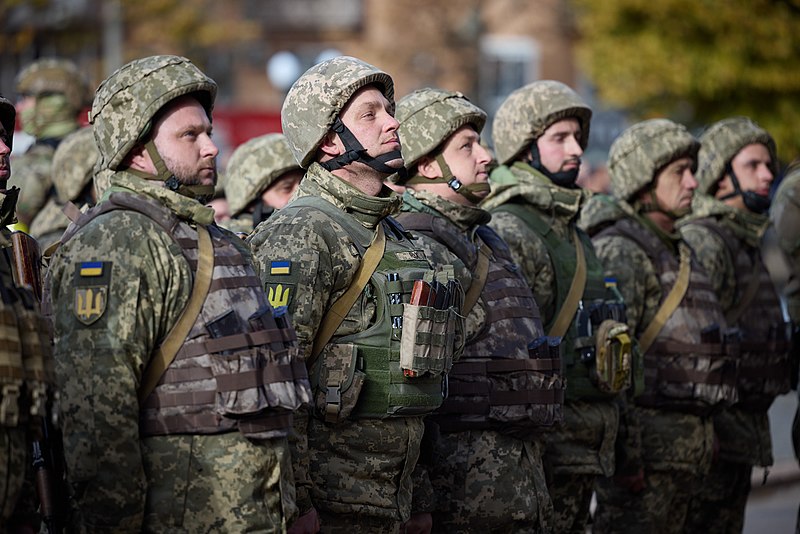The European Union announced that it would be setting up a military assistance mission for Ukraine’s armed forces. This follows Kyiv’s request for such support, with 15,000 Ukrainian troops set to receive training.
The EU’s foreign policy chief Josep Borrell told reporters Tuesday that the bloc’s military assistance mission for Ukraine’s military was in response to Russia’s invasion. Borrell said that around 15,000 Ukrainian troops would be trained in different EU countries “as part of the mission.”
“It is going to be a big effort to renew, increase, improve the capacities of the Ukrainian army,” said Borrell, adding that the mission would be in effect in the next three months.
The bloc’s military assistance mission would be led by French Vice Admiral Herve Blejean. The EU defense ministers also agreed to provide funding of $16.5 million under the European Peace Facility for a span of 24 months. The EPF is the bloc’s instrument to maintain peace.
The announcement by the EU was welcomed by NATO Secretary-General Jens Stoltenberg, telling reporters in Brussels that the mission would complement what the NATO alliance is already doing. Stoltenberg stressed the importance of providing more training.
This comes as France and Germany have often been criticized by Kyiv for not sending enough weapons, and this is seen as a way for the two countries to make up for the criticism. Before the EU defense ministers meeting, German defense minister Christine Lambrecht said that around 5,000 Ukrainian troops would be trained in Germany until June 2023, and a repair center would be established in Slovakia.
Meanwhile, the leaders of the G20 countries issued a declaration that strongly condemned Russia’s invasion of Ukraine. The final communique was approved Wednesday following the two-day summit in Indonesia, with the majority of the members condemning the war, noting that there are other views.
The communique said that international law must be upheld while also condemning the threat of nuclear weapons, welcoming the extension of the Black Sea Grain Initiative. The communique added that the war affected the global economy and that the G20 countries’ central banks will continue to calibrate the pace of the tightening of monetary policy.



 Trump’s Inflation Claims Clash With Voters’ Cost-of-Living Reality
Trump’s Inflation Claims Clash With Voters’ Cost-of-Living Reality  Nighttime Shelling Causes Serious Damage in Russia’s Belgorod Region Near Ukraine Border
Nighttime Shelling Causes Serious Damage in Russia’s Belgorod Region Near Ukraine Border  Iran–U.S. Nuclear Talks in Oman Face Major Hurdles Amid Rising Regional Tensions
Iran–U.S. Nuclear Talks in Oman Face Major Hurdles Amid Rising Regional Tensions  Federal Judge Restores Funding for Gateway Rail Tunnel Project
Federal Judge Restores Funding for Gateway Rail Tunnel Project  Trump Says “Very Good Talks” Underway on Russia-Ukraine War as Peace Efforts Continue
Trump Says “Very Good Talks” Underway on Russia-Ukraine War as Peace Efforts Continue  India–U.S. Interim Trade Pact Cuts Auto Tariffs but Leaves Tesla Out
India–U.S. Interim Trade Pact Cuts Auto Tariffs but Leaves Tesla Out  Trump Signs “America First Arms Transfer Strategy” to Prioritize U.S. Weapons Sales
Trump Signs “America First Arms Transfer Strategy” to Prioritize U.S. Weapons Sales  Trump Allows Commercial Fishing in Protected New England Waters
Trump Allows Commercial Fishing in Protected New England Waters  Jack Lang Resigns as Head of Arab World Institute Amid Epstein Controversy
Jack Lang Resigns as Head of Arab World Institute Amid Epstein Controversy  South Korea Assures U.S. on Trade Deal Commitments Amid Tariff Concerns
South Korea Assures U.S. on Trade Deal Commitments Amid Tariff Concerns  Norway Opens Corruption Probe Into Former PM and Nobel Committee Chair Thorbjoern Jagland Over Epstein Links
Norway Opens Corruption Probe Into Former PM and Nobel Committee Chair Thorbjoern Jagland Over Epstein Links  TrumpRx.gov Highlights GLP-1 Drug Discounts but Offers Limited Savings for Most Americans
TrumpRx.gov Highlights GLP-1 Drug Discounts but Offers Limited Savings for Most Americans  Missouri Judge Dismisses Lawsuit Challenging Starbucks’ Diversity and Inclusion Policies
Missouri Judge Dismisses Lawsuit Challenging Starbucks’ Diversity and Inclusion Policies  China Warns US Arms Sales to Taiwan Could Disrupt Trump’s Planned Visit
China Warns US Arms Sales to Taiwan Could Disrupt Trump’s Planned Visit  Trump Backs Nexstar–Tegna Merger Amid Shifting U.S. Media Landscape
Trump Backs Nexstar–Tegna Merger Amid Shifting U.S. Media Landscape  New York Legalizes Medical Aid in Dying for Terminally Ill Patients
New York Legalizes Medical Aid in Dying for Terminally Ill Patients 































